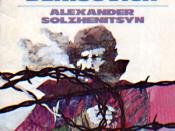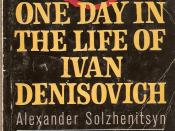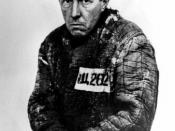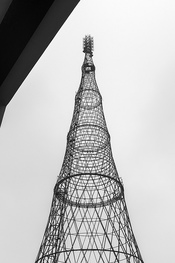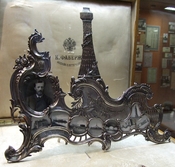In the novel "A day in the life of Ivan Denisovich" by Solzhenitsyn, I found that Ivan Denisovich (Shukhov) resisted the dehumanizing aspects of the gulag; by not allowing the spirit destroying atmosphere of the gulag to take away his human dignity and appreciation for life.
Throughout the story, the author concentrates on the theme of time and it's significance to Shukhov's existence in the gulag. Time in this sense can be broken into two separate entities. The first example is the time owned by the guards in the prison, where Shukhov's daily routines are strictly regimented and monitored. As this time does not belong to him, it almost appears to be surreal. The second form of "time" is that which Shukhov manages to find for himself. During these rare and precious moments, our character is able to reflect upon and remember him self, thus helping him to maintain some degree of dignity and pride, which appear to be the most fundamental of his attributes.
However as these moments are sporadic and scarce, the time he takes is often in his own mind with his thoughts allowing him the freedom he so richly craves, even while under scrutiny. To further illustrate these observations, consider the following examples from a day in the life of Shukhov.
At five o'clock in the morning the reveille sounds and Ivan Denisovivh Shukhov awakens to the icy cold barracks of the Soviet prison camp. Often he awakens immediately because the following ninety minutes are his. Every morning before roll call, Shukhov is making money sewing mittens, bringing people their valenki (felt work boots), or helping in the mess hall. However Shukhov tries to avoid the mess hall because licking the left over bowls for extra food is too tempting. Shukhov remembers what an old prisoner Kuziomin once told him, "That people who lick out others bowls and count on doctors don't survive in the gulag." On this morning Shukhov had been feeling ill and remained in bed. As he lay there trying to stay warm, the Tarter came in and sentenced him to 3 days penalty of hard work. Shukhov followed the Tarter to the commandant's office and is ordered to scrub the floor. While scrubbing the floor he upset the guard who said, "Didn't you ever watch your wife scrub the floor, pig?" Shukhov responds by saying, "I was taken from my wife in forty-one, citizen chief. I've forgotten what she looks like." This statement impacts the reader because of the pain felt by Shukhov.
Upon returning to his squad in the mess hall he finds Fetiukov, saving his meal. The few minutes at mealtime belongs to the prisoners, and Shukhov takes his time eating his cold food (consisting of cabbage, bony fish and magara): with a spoon that he cast himself, and carries in his boot for safekeeping. Shukhov saves his bread for later, just in case their food rations are not distributed.
Leaving the mess hall Shukhov knows that it is almost roll call. Upon returning to his squad he notices that Tsezar is smoking, so Shukhov politely stands beside him. Whereas, Fetiukov is greedy and stares right at Tsezar's mouth and asks for a drag. Due to the respect that Shukhov showed by just standing there and not being greedy, Tsezar gives the smoke to Shukhov. It is extremely important to Shukhov that he never, "lower himself like Fetiukov, he would never look at a man's mouth." To do so would be as degrading as licking another man's bowl, and would drive a man down the same path Kuziomin described, leading to inhumanity and death.
Shukhov and his squad were ordered to work at the power plant site. If he and the members of his squad did not work their hardest, they would be deprived of food. Work is necessary for Shukhov's survival. In the same sense work is an escape "" an escape from thinking and worrying about his lengthy prison sentence. Shukhov takes pride in his work; it gives him the dignity necessary to remain human under such deprived conditions. He is also the kind of man that appears not to shy away from hard work. This attribute prevents camp authorities from inflicting punishment, although his personal punishment is the time he is away from his family and his freedom, not the work he is ordered to do.
The sun is setting and the final bell is sounded for head count, dinner and receiving packages. Shukhov's enjoyment in the few minutes while he eats are very moving to me because of its simplicity; most people are unable to appreciate their every moment they have of freedom. Shukhov does not hope for immediate release or an easy term in the prison but simply to survive. It is what he needs to believe in, inorder to continue to exist in this environment.
When the Soviet authorities announce that the prisoners will work on Sunday they appear as thieves to Shukhov: "Again there wasn't going to be a Sunday this week; again they were going to steal one of their Sundays." This reference to time indicates once again the importance that time has on survival. The authorities have stripped them of their time not only the opportunity to take a nap but also the time needed to help improve their living conditions and social activities.
At the end of this novel, it is surprising to understand that Solzhenitsyn describes this day of Shukhov's as an "almost happy day", considering all the despair and the hardship that Shukhov has gone through. Most people could never imagine enduring this kind of punishment and sentence, when in reality Shukhov should have been given a medal of honour or the very least, recognition for his efforts in the war. Throughout it all, however, Shukhov survived with his morals and human dignity.
